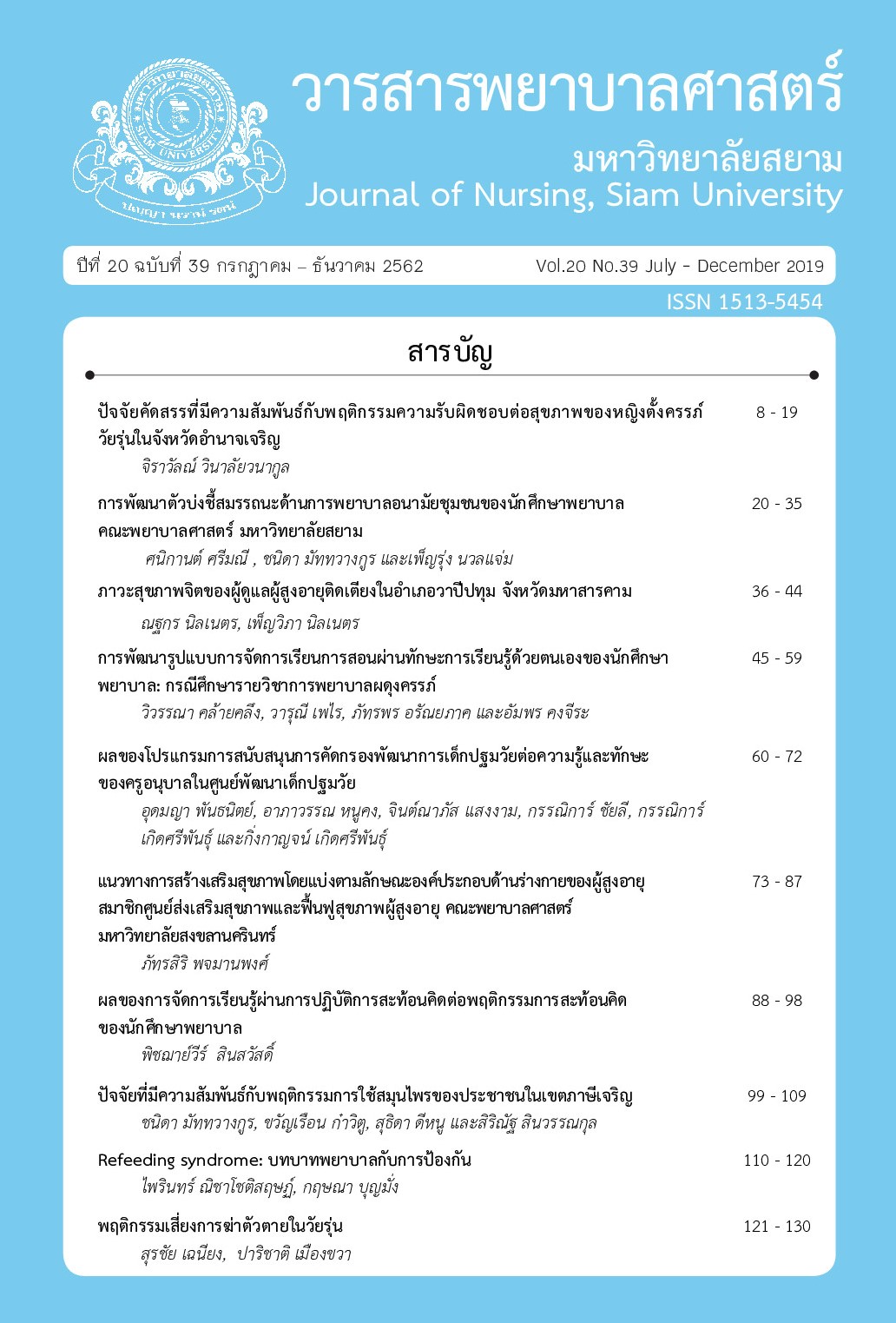The Refeeding syndrome: Nursing Role of Refeeding Syndrome Prevention
DOI:
https://doi.org/10.14456/jnsu.v20i39.182916คำสำคัญ:
ภาวะขาดอาหาร, การให้สารอาหารทดแทน, ภาวะฟอสเฟตในเลือดต่ำ, กระบวนการพยาบาลบทคัดย่อ
กลุ่มอาการที่เกิดขึ้นหลังจากให้สารอาหารทดแทน ภายหลังจากการขาดสารอาหารรุนแรง หรืออดอาหาร เป็นเวลานาน หรือ Refeeding syndrome; RFS พบมากถึงร้อยละ 20-39 ของทุกกลุ่มผู้ป่วย เป็นความผิดปกติทางเมตาบอลิกที่เกิดจากการเคลื่อนที่ของแร่ธาตุที่สำคัญเข้าสู่เซลล์อย่างรวดเร็ว ทำให้ผลเกิดภาวะเสียสมดุลของอิเล็คโตรลัยท์ โดยเฉพาะภาวะฟอสเฟตในเลือดต่ำ ส่งผลให้ระบบต่างๆในร่างกายทำงานผิดปกติและเสียชีวิตได้ในที่สุด ซึ่งผู้ป่วยแต่ละรายมีโอกาสในการเกิดกลุ่มอาการมากน้อยต่างกันขึ้นอยู่กับสภาพร่างกายดังนั้นการค้นหาผู้ป่วยกลุ่มเสี่ยง และการจัดการที่เหมาะสมจะช่วยลดอัตราการเกิดRFSได้ การสามารถระบุกลุ่มเสี่ยงว่าผู้ป่วยมีความเสี่ยงระดับต่ำ สูง หรือสูงมากโดยใช้แบบประเมินปัจจัยเสี่ยงของการเกิดภาวะ RFS ก่อนที่จะเริ่มให้สารอาหารทดแทน จากนั้นให้การดูแลอย่างเหมาะสมตามระดับความเสี่ยงโดยใช้ใช้แนวทางการป้องกันการเกิดภาวะ RFS และการเฝ้าระวังอาการเปลี่ยนแปลง โดยการประเมินผลลัพธ์ติดตามอาการอย่างต่อเนื่อง และใกล้ชิด
ภายใต้องค์ความรู้เกี่ยวกับการเปลี่ยนแปลงทางพยาธิสรีรวิทยาของภาวะ RFS พยาบาลสามารถใช้กระบวนการพยาบาล ซึ่งประกอบด้วยการประเมินสภาพ การวินิจฉัยการพยาบาล การวางแผนการพยาบาล การปฏิบัติการพยาบาล และการประเมินผล ในการปฏิบัติการดูแลผู้ป่วยที่มีภาวะขาดสารอาหารรุนแรง หรืออดอาหาร เป็นเวลานาน ก่อนและขณะให้สารอาหารทดแทนให้ปลอดภัยจากภาวะ RFS ได้
* คณะพยาบาลศาสตร์ วิทยาลัยนานาชาติเซนต์เทเรซา
Refeeding syndrome; RFS is a clinical symptom that occurred when initiation of nutritional therapy after prolong starvation or severe malnourishment. It has been reported incidence rate of 20-39% in the patient population. RFS is a life-threatening metabolic condition following the sudden intracellular electrolyte shift resulted in electrolyte imbalance or drop of plasma level, particularly hypophosphatemia lead to adverse events and death. The identification and appropriate management of individual high-risk patient is crucial because the individual prone is different. Additionally, RFS is prevented by classified patients into low risk, high risk, and very high-risk categories before the appropriate initiation of nutritional replenishment in each group. During careful nutritional therapy, the guideline is recommended for using and helping individual clinical judgment. As well as individual
เอกสารอ้างอิง
วิจิตรา กุสุมภ์ และคณะ. (2556). กระบวนการพยาบาล และข้อวินิจฉัยการพยาบาล : การนำไปใช้ในคลินิก พิมพ์ครั้งที่ 3.กรุงเทพฯ : บพิธการพิมพ์
Araujo Castro, M., & Vázquez Martínez, C. (2018). The refeeding syndrome. Importance of phosphorus. Medicina Clínica (English Edition), 150(12), 472-478.doi:https://doi.org/10.1016/ j.medcle.2018.03.018
Boateng, A. A., Sriram, K., Meguid, M. M., & Crook, M. (2010). Refeeding syndrome: Treatment considerations based on collective analysis of literature case reports. Nutrition, 26(2), 156-167. doi:https://doi.org/10.1016/j.nut.2009.11.017
Brozek, J., Chapman, C. B., & Keys, A. (1948). Drastic food restriction; effect on cardiovascular dynamics in normotensive and hypertensive conditions. J Am Med Assoc, 137(18), 1569-1574.
Crook, M. A. (2014). Refeeding syndrome: Problems with definition and management. Nutrition, 30(11), 1448-1455.doi:https://doi.org/10.1016/j.nut.2014.03.026
Dror, Y., Almashanu, S., Lubart, E., Sela, B. A., Shimoni, L., & Segal, R. (2013). The impact of refeeding on blood fatty acids and amino acid profiles in elderly patients: a metabolomic analysis. JPEN J Parenter Enteral Nutr, 37(1), 109-116. doi:10.1177/0148607112443260
Fernandez Lopez, M. T., Gomez Marquez, A. M., Casado Vazquez, L., Alonso Urrutia, S., Bardasco Alonso, M. L., Rivero Luis, M. T., . . . Mato Mato, J. A. (2017). [Incidence of hypophosphatemia in not critically ill patients with enteral feeding]. Nutr Hosp, 34(4), 761-766. doi:10.20960/nh.615
Friedli, N., Stanga, Z., Culkin, A., Crook, M., Laviano, A., Sobotka, L., . . . Schuetz, P. (2018). Management and prevention of refeeding syndrome in medical inpatients: An evidence-based and consensus-supported algorithm. Nutrition, 47, 13-20.doi:https://doi.org/10.1016/j.nut.2017.09.007
Friedli, N., Stanga, Z., Sobotka, L., Culkin, A., Kondrup, J., Laviano, A., . . . Schuetz, P. (2017). Revisiting the refeeding syndrome: Results of a systematic review. Nutrition, 35, 151-160. doi:https://doi.org/10.1016/j.nut.2016.05.016
Igarashi, A., Okuno, T., Ohta, G., Tokuriki, S., & Ohshima, Y. (2017). Risk Factors for the Development of Refeeding Syndrome-Like Hypophosphatemia in Very Low Birth Weight Infants. Dis Markers, 2017, 9748031. doi:10.1155/2017/9748031
Kameoka, N., Iga, J., Tamaru, M., Tominaga, T., Kubo, H., Watanabe, S. Y., . . . Ohmori, T. (2016). Risk factors for refeeding hypophosphatemia in Japanese inpatients with anorexia nervosa. Int J Eat Disord, 49(4), 402-406. doi:10.1002/eat.22472
Mehanna, H. M., Moledina, J., & Travis, J. (2008). Refeeding syndrome: what it is, and how to prevent and treat it. BMJ, 336(7659), 1495.
Olthof, L. E., Koekkoek, W., van Setten, C., Kars, J. C. N., van Blokland, D., & van Zanten, A. R. H. (2017). Impact of caloric intake in critically ill patients with, and without, refeeding syndrome: A retrospective study. Clin Nutr. doi:10.1016/j.clnu.2017.08.001
Olthof, L. E., Koekkoek, W. A. C. K., van Setten, C., Kars, J. C. N., van Blokland, D., & van Zanten, A. R. H. (2017). Impact of caloric intake in critically ill patients with, and without, refeeding syndrome: A retrospective study. Clinical Nutrition. doi:https://doi.org/10.1016/j.clnu.2017.08.001
Pourhassan, M., Cuvelier, I., Gehrke, I., Marburger, C., Modreker, M. K., Volkert, D., . . . Wirth, R. (2018). Risk factors of refeeding syndrome in malnourished older hospitalized patients. Clinical Nutrition, 37(4), 1354-1359.doi:https://doi.org/10.1016/j.clnu.2017.06.008
Pourhassan, M., Cuvelier, I., Gehrke, I., Marburger, C., Modreker, M. K., Volkert, D., . . . Wirth, R. (2018). Prevalence of Risk Factors for the Refeeding Syndrome in Older Hospitalized Patients. J Nutr Health Aging, 22(3), 321-327. doi:10.1007/s12603-017-0917-0
Rio, A., Whelan, K., Goff, L., Reidlinger, D. P., & Smeeton, N. (2013). Occurrence of refeeding syndrome in adults started on artificial nutrition support: prospective cohort study. BMJ Open, 3(1). doi:10.1136/bmjopen-2012-002173
Rutten, J. J. S., Post, H., de Weert-van Oene, G. H., & Buwalda, V. J. A. (2017). [Refeeding syndrome during alcohol detoxification]. Tijdschr Psychiatr, 59(8), 494-498.
Tresley, J., & Sheean, P. M. (2008). Refeeding syndrome: recognition is the key to prevention and management. J Am Diet Assoc, 108(12), 2105-2108. doi:10.1016/j.jada.2008.09.015
Vignaud, M., Constantin, J.-M., Ruivard, M., Villemeyre-Plane, M., Futier, E., Bazin, J.-E., & Annane, D. (2010). Refeeding syndrome influences outcome of anorexia nervosa patients in intensive care unit: an observational study. Critical Care, 14(5), R172-R172. doi:10.1186/cc9274
Windpessl, M., Mayrbaeurl, B., Baldinger, C., Tiefenthaller, G., Prischl, F. C., Wallner, M., & Thaler, J. (2017). Refeeding Syndrome in Oncology: Report of Four Cases. World J Oncol, 8(1), 25-29. doi:10.14740/wjon1007w
ดาวน์โหลด
เผยแพร่แล้ว
รูปแบบการอ้างอิง
ฉบับ
ประเภทบทความ
สัญญาอนุญาต
เนื้อหาและข้อมูลที่เผยแพร่ในวารสารพยาบาลศาสตร์ มหาวิทยาลัยสยามถือเป็นข้อคิดเห็นและความรับผิดชอบของผู้นิพนธ์บทความโดยตรง
บทความ เนื้อหา ข้อมูล รูปภาพ ฯลฯ ที่ได้รับการเผยแพร่ในวารสารพยาบาลศาสตร์ มหาวิทยาลัยสยาม ถือเป็นลิขสิทธิ์ของวารสารพยาบาลศาสตร์ มหาวิทยาลัยสยาม หากบุคคลหรือหน่วยงานใดต้องการนำทั้งหมดหรือส่วนหนึ่งส่วนใดไปเผยแพร่หรือเพื่อกระทำการใด ๆ จะต้องอ้างอิงวารสารพยาบาลศาสตร์ มหาวิทยาลัยสยามทุกครั้ง



